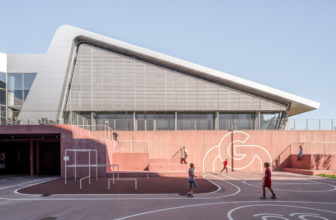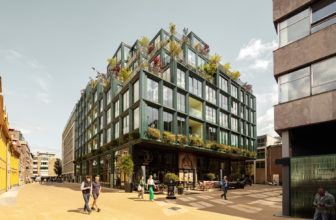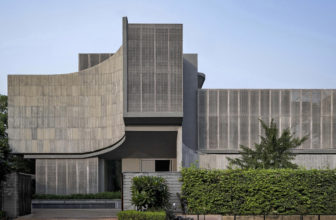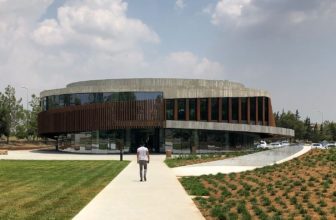As we are marching through the era of globalization and information, expanding our knowledge and career opportunities is more than necessary. However, managing time between demanding work hours and education can be really challenging. In our previous article +500 Free Online Courses in Architecture, Art, Design & Engineering, we gave you a list of available courses from the world’s best architecture universities. If you found that useful and want to dive deeper into the world of e-learning at your own pace and flexible schedules, here are the 20 best free online college courses on architecture for you.

Read more:
-
+500 Free Online Courses in Architecture, Art, Design & Engineering
-
10 Popular Non-Architectural Online Courses That Architects Need to Check
-
10 Sustainable Design Online Courses Available for Free
Architectural Online College Courses
1. Making Architecture at IE School of Architecture & Design
With lectures taking place in the design studio of the IE School of Architecture and Design and also in various locations in the city of Segovia (Spain), this class offers an insight into the work and mind of an architect. It uses the environment to stimulate design ideas and then moves on to more technical aspects of architecture such as composition, form, and shape.
2. Practices for Sustainable Architecture at Philadelphia University
This course begins with a brief review of the context, motivations, frameworks, and principles necessary to put a sustainable design into practice. The students will learn the basic techniques needed to build and operate a highly functioning green building and then move to eco-villages and green cities.
3. Principles for Sustainable Design at Philadelphia University
This class focuses on sustainability in a historical context, trying to extract the basic principles, rules, and framework and set the foundations for a better sustainable design of future cities.
4. Engineering: Building with Nature at TU Delft
It’s more of an engineering class but is quite useful if you are interested in learning methods of building with natural materials and some basic principles of engineering. You will focus on an ecosystem-based design concept and its applications in water and coastal systems.
5. The Art of Structural Engineering: Bridges at Princeton University
Here’s another engineering class that you may also find interesting as you explore the efficiency, economy, and elegance of the mega projects of bridges. With a focus on some significant bridges built since the industrial revolution, the course illustrates how engineering is a creative discipline and can become an art.
6. Principles of Designing for Humans at University of Michigan
With access to social theories, especially psychology, this class aims to give us a better understanding of human interaction in design and give us more efficient solutions on user experience based on emotional and social factors.
7. Architecture Studio: Building in Landscapes at MIT
Taught by Jan Wampler, professor of architecture at MIT, this undergraduate course introduces skills needed to build within a landscape establishing continuities between the built and natural world. Students learn to build appropriately through the analysis of landscape and climate for a chosen site and to conceptualize design decisions through drawings and models.
History of Architecture Courses
1. History of Chinese Architecture at Tsinghua University
For all of you interested in Asian culture and architecture, this is a very interesting course. Although the lectures are in Mandarin, there are English subtitles available. You will learn about the foundations of Chinese Architecture and how the Ming and Qing dynasties affected the construction and aesthetics of imperial palaces, pagodas, religious structures, and gardens.
2. A Global History of Architecture at MIT
How do we understand architecture? One way is looking at its history, not on a linear narrative but rather on focusing more on certain architectural “moments”. The introduction of iron, religious formations, political changes, all had an impact on our perception of the built environment through the lens of history.
3. Frank Lloyd Wright and the 20th Century at Open Online Academy
On completing this course you will be familiar with Frank Lloyd Wright’s career evolution and have an in-depth understanding of some of his key buildings. By exploring his organic architecture, you will be able to define the roots of this mixture of East and West culture and how this aspect transformed 20th-century architecture.
4. Exploring architecture, buildings, and monuments through the ages at Alison
This free online course reviews early buildings and monuments from the Roman Empire through to the Middle Ages. It looks at examples such as Renaissance and Baroque architecture and well-known examples of 19th and 20th-century buildings. It is a good opportunity to learn more and get inspired by great works of the past.
Theory of Architecture Courses
1. Four Facets of Contemporary Japanese Architecture: Theory at the University of Tokyo
This is the first one of the series Four Facets of Contemporary Japanese Architecture: theory, technology, city, and humans. This class features discussions with famous Japanese architects such as Arata Isozaki, Hisao Kohyama, and Kengo Kuma, showing their buildings and explaining their concepts. You can find the second part of the series that has already been released in the link below:
Four Facets of Contemporary Japanese Architecture: Technology
2. The Architectural Imagination at Harvard
In this course, you will learn how to “read” architecture as a cultural expression as well as a technical achievement from a study of history’s important buildings. From basic architecture principles in representation and forms, you will develop your understanding of the social and historical contexts behind major works of architecture.
3. The Search for Vernacular Architecture of Asia at The University of Hong Kong
Vernacular Architecture is the subject and study of everyday buildings, landscapes, and sites that are not designed by professional architects but “ordinary” practitioners. It explores this practice as an expression of local identity, indigenous traditions, native materials and offers a better understanding of the built environment.
4. Contemporary Architecture at Open Online Academy
This course will analyze major contemporary architectural ideas, ideologies, and projects in the context of both globalization and specific local contexts. Students will trace the development of architecture since the early 90s by discussing the work of some of the most influential architects of our time.
5. Modern Japanese Architecture: From Meiji Restoration to Today at Tokyo Tech
This course aims to illustrate the present state of Japanese Modernist and postmodern building, as well as the distance covered over the past 150 years and how their culture and history have affected today’s materials and structural designs.
Courses on Urbanism
1. Future Cities at ETH Zurich
The only way to better understand the city is by going beyond the physical appearance and by focusing on different representations, explore it as the most complex human-made “organism”. The course focuses on existing and new cities, leading to the approach of the future city.
2. Smart Cities at ETH Zurich
An interesting course on how data and information impact the design, sustainability, and resilience of future cities. Why are these cities a prototype and what are the challenges for them in the future?
3. Designing Cities at the University of Pennsylvania
Through round-table discussion, this class explores how the decisions for the city are taken and what we can do to improve them. Designing Cities draws on many subjects and responds to so many different geographical and social conditions, that even if you are not an architect or urban planner you can find an aspect that interests you.
4. Quality of Life: Livability in Future Cities at ETH Zurich
This urban planning course will focus on four areas that directly affect livability in a city: Urban energy, urban climate, urban ecology, and urban mobility. Through case studies and personal experiences, you will be able to understand how to make a city more livable by going beyond the physical appearance and by focusing on different properties and impact factors of the urban system.





